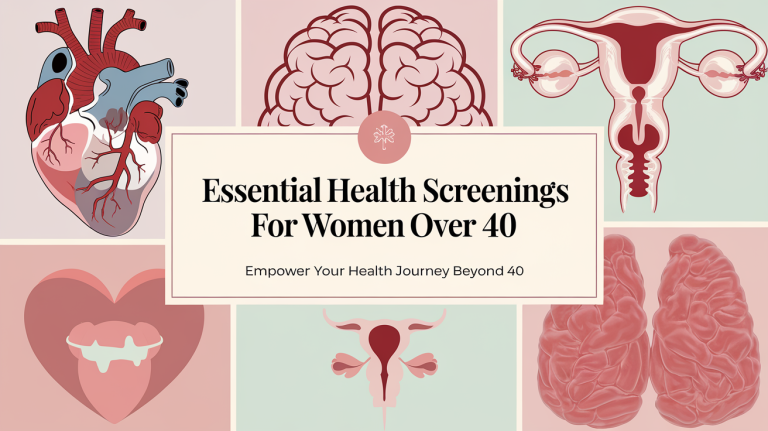Why Hormonal Shifts After 40 Make Weight Loss More Challenging (And How to Adapt)
This page may contains affiliate links. We may earn a commission for purchases made at no additional cost to you. The content on this website was created with the help of AI.
For many women over 40, weight management becomes a puzzle where the pieces no longer fit. You might eat the same meals, follow the same workouts, and yet the scale refuses to cooperate. This isn’t a failure of discipline—it’s a biological shift. Hormonal changes, metabolic slowdown, and lifestyle demands create a perfect storm that requires a new approach. Let’s explore why this happens and how modern strategies can help you regain control.
The Hormone-Weight Connection in Your 40s and Beyond

Perimenopause and menopause bring dramatic fluctuations in estrogen and progesterone, two hormones that play a critical role in metabolism and fat storage. Estrogen, in particular, helps regulate insulin sensitivity and body fat distribution. As levels drop:
- Metabolism slows: Research shows women can burn up to 100-300 fewer calories daily post-40, even with the same activity levels.
- Fat storage shifts: Subcutaneous fat (the kind under your skin) decreases, while visceral fat (around organs) increases, raising the risk of heart disease and diabetes.
- Hunger hormones spike: Ghrelin (the “hunger hormone”) rises, while leptin (the “fullness hormone”) drops, leading to persistent cravings.
These changes are compounded by age-related muscle loss (sarcopenia), which further reduces metabolic rate.
Why “Eat Less, Move More” Fails Women Over 40

Traditional calorie-cutting diets often worsen the problem. Severe restriction can:
- Trigger muscle loss: Without adequate protein and strength training, the body burns muscle instead of fat.
- Raise cortisol: Chronic stress from undereating or overexercising promotes abdominal fat storage.
- Crash energy levels: Low-calorie diets leave many women feeling fatigued, making it harder to stay active.
A 2022 study in Menopause Journal found that women over 40 on low-calorie diets regained 70% of lost weight within a year, often ending up heavier than they started.
The Science of GLP-1 Medications: A New Frontier

GLP-1 (glucagon-like peptide-1) medications like semaglutide have revolutionized weight management by addressing biological drivers of weight gain. These medications:
- Regulate appetite: They slow stomach emptying and act on brain receptors to reduce hunger and cravings.
- Improve insulin function: By enhancing insulin secretion, they stabilize blood sugar—critical for women with perimenopausal insulin resistance.
- Support sustainable loss: Clinical trials show women using GLP-1 therapies lose 3-4x more weight than with lifestyle changes alone.
Importantly, these medications aren’t a standalone solution. They work best alongside personalized nutrition, stress management, and resistance training to preserve muscle.
Building a Personalized Weight Loss Strategy After 40

A holistic approach tailored to your unique biology is key. Here’s what to prioritize:
- Hormone testing: Identify imbalances in estrogen, cortisol, or thyroid hormones that could sabotage progress.
- Protein-first nutrition: Aim for 25-30g of protein per meal to combat muscle loss and stabilize blood sugar.
- Strength training: Lift weights 2-3x weekly—muscle is metabolically active and burns calories even at rest.
- Stress reduction: Chronic stress raises cortisol. Try yoga, meditation, or even 10-minute daily walks to reset.
Programs like The Center for Medical Weight Loss combine these elements with medical oversight, ensuring your plan adapts as your body changes.
The Role of Medical Supervision in Midlife Weight Loss
Generic plans rarely work for women navigating perimenopause or menopause. A medically supervised program offers:
- Metabolic testing: Measures resting metabolic rate to set accurate calorie targets.
- Hormone optimization: Addresses imbalances through lifestyle tweaks or bioidentical therapies (if appropriate).
- Accountability: Regular check-ins with clinicians or coaches prevent derailment.
For example, The Center for Medical Weight Loss pairs advanced therapies with expert guidance, helping women break plateaus without extreme measures.
Real-Life Success: How Women Over 40 Are Thriving
Maria, 52, struggled with 35 pounds of menopause-related weight gain. After years of yo-yo dieting, she joined a program that included hormone testing and GLP-1 therapy. “For the first time, I understood why my body was changing,” she says. “With weekly coaching and meals designed for my insulin levels, I lost 22 pounds in 4 months—and kept it off.”
Your Next Steps: Working With Your Body, Not Against It

Weight loss after 40 isn’t about willpower—it’s about strategy. If you’re tired of spinning your wheels, consider exploring programs that blend modern science with personalized care. Look for clinics offering:
- Comprehensive lab work (thyroid, hormones, inflammation markers).
- Customized meal plans that prioritize protein and fiber.
- Expert support to adjust your plan as your body evolves.
The Center for Medical Weight Loss is one such program, designed specifically for women navigating the complexities of midlife weight management.






